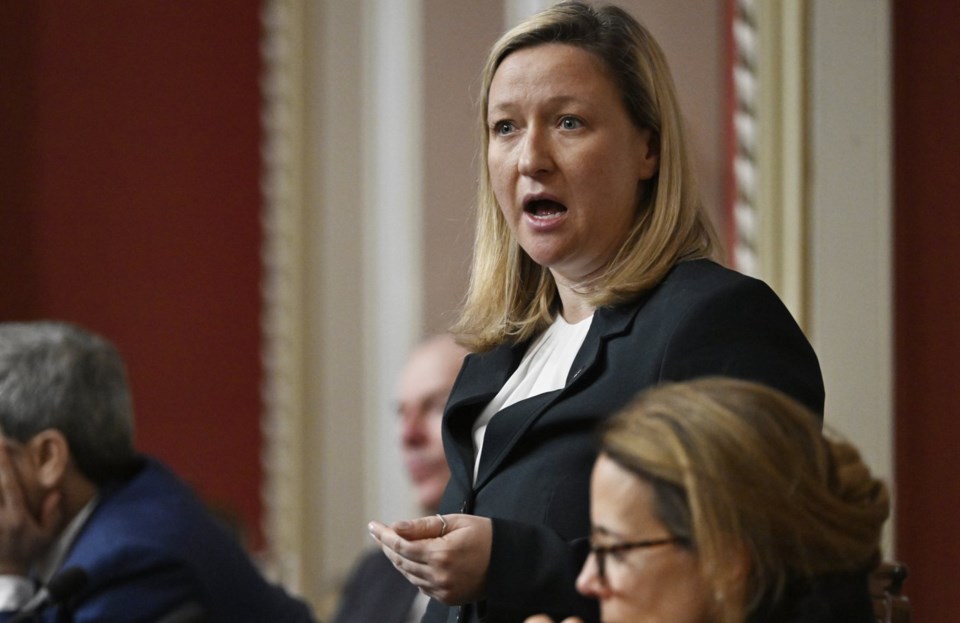MONTREAL — The Quebec government is trying to ease rising tensions between forestry workers and Indigenous protesters who oppose a new bill they say threatens their way of life.
Natural Resources Minister Maïté Blanchette Vézina and Indigenous Affairs Minister Ian Lafrenière announced Tuesday they were meeting with three Atikamekw communities in Quebec's Mauricie region, roughly 200 kilometres north of Montreal.
The region has been the site of recent tense confrontations between protesters and industry workers over a series of blockades that have disrupted operations for some in the forestry sector.
“I am very concerned about the situation,” Blanchette Vézina said Tuesday on X. “It is essential that we speak calmly and respectfully.”
The Assembly of First Nations Quebec–Labrador is expected to meet with the office of Premier François Legault on Wednesday.
The conflict stems from a bill tabled in the Quebec legislature this spring that aimed to protect communities dependent on the forestry industry. The legislation would divide public forests into zones designated for conservation, multi-purpose use or forestry.
According to the bill, actions that "restrict the carrying out of forest development activities" would be prohibited in the forestry zones, as would conservation measures.
Indigenous leaders were quick to criticize the bill, saying it infringed on their rights. In July, the AFNQL announced it was walking away from discussions with the government, who it said had not shown “genuine political will” to collaborate on the forestry reform.
After the bill was tabled, an organization called MAMU First Nation, which describes itself as a group of hereditary chiefs and land defenders, began organizing blockades of forestry roads in the province. The group says the proposed legislation threatens caribou, forest sustainability and traditional Indigenous ways of life. A spokesperson declined an interview request from The Canadian Press.
The blockades have led to hostile exchanges between the group's members and forestry workers, both in person and online. Daniel Paré, the owner of a forestry business based in the Saguenay–Lac-St.-Jean region, said he’s barely been able to work since the spring and has no money coming in.
“It’s really catastrophic,” he said in an interview. “We’re imprisoned in our houses and we can’t do anything about it. … We’re powerless.”
On Saturday, Paré put out a call on Facebook for other affected workers to join him and confront the Indigenous group on Monday at a blockade near La Tuque, Que., though the plan didn’t materialize.
“Our goal isn’t to wage war,” he said. “It’s just to get along and go to work.”
Amid the growing tension, Lafrenière and the Wemotaci Atikamekw Council published statements over the weekend calling for calm.
But some are asking the government to do more to end the blockades. "While these actions paralyze our forest economy, isolate families, and threaten the stability of an entire region, the government chooses to remain inactive," La Tuque Mayor Luc Martel said in a social media statement last week.
"Allowing the situation to deteriorate is not only a political error, but also a clear abandonment of the people who live and work in this forest."
In an interview, AFNQL Chief Francis Verreault-Paul said he's concerned about tensions spilling over into violence. But he said the Quebec government has the power to defuse the situation by working with First Nations leaders to modify the bill.
Verreault-Paul said the government reached out to the assembly to arrange Wednesday's meeting, and has shown a "general openness" to addressing its demands. Among other things, the assembly has called for the bill's zoning strategy to be scrapped.
"It's hard to understand why this process has to be so polarizing and the solution so slow in coming," he said. "So now, it's really about speeding things up. That's the message we're sending."
This report by The Canadian Press was first published Aug. 19, 2025.
Maura Forrest, The Canadian Press




